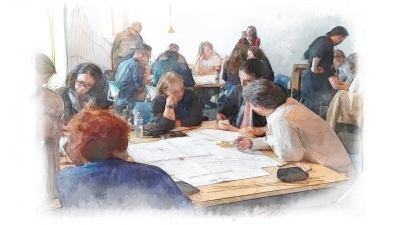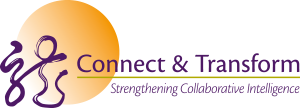Dynamic Collaboration – Next-level systemic thinking tools for leaders: facilitate integrated decision-making
Discover how you can start thinking about what you are not yet thinking about and increase the quality of team dialogue

Dynamic collaboration builds on three recent scientific insights. The first insight is that the essence of functions and roles is the essential difference employees must make. This starkly contrasts a focus on activities that must be performed. The second insight is based on the fact that employees evolve throughout life and build on how this evolution affects their perspective-taking, problem approach, and “collaborative” approach. This complements a one-sided focus on competencies and skills. The third insight is that the fundamental strength of winning teams is co-reflective thinking, how they bring things together while thinking. Again, this starkly contrasts the assumption that the chemistry between team members and the associated behavioral skills make the difference.
This program is designed to support executives in crucial leadership transitions, namely those related to the need to think and decide more broadly, let go of the ego, and realize stronger connections in collaboration from there on, on the other.
As a participant, you will learn the following:
– observe your assumptions and thinking patterns and make them workable;
– identify problems and issues before they become intractable;
– effectively identify, clarify, and leverage relevant perspectives to improve the quality of decisions;
– determine when and to what extent collaboration is appropriate in a given decision-making context;
– facilitate and participate in effective collaborative decision-making;
– create an environment conducive to effective communication, collaboration, and decision-making;
This Next Level Systems Thinking Tools for Leaders program provides the foundation to help teams work together, think together, and come to more integrated decision-making. The focus is on influencing the depth and breadth with which problems and challenges are considered and, by extension, moving toward more comprehensive, more integrative decision-making.
As a participant, you learn to observe the thought structures of others and the ones you use yourself, allowing you to begin to think about what you have not thought about at the time. We also practice thought-opening questions extensively, allowing you to better manage the co-reflective process in teams. Executives discover how to conduct more effective strategic and innovation dialogues. Facilitators broaden their intervention repertoire and will be able to encourage teams to self-direct more effectively.
The program runs over three days.
Day 1
Morning: How can we begin to think about what we are not yet thinking about?
In this introductory session, we outline the deeper thinking framework. This is based on the four principles of dialectical thinking, namely how to start from:
- The larger encompassing whole when approaching problems (everything is both a “part of” and a “larger whole for”).
- Dynamism and constant change (everything that exists is in motion).
- Essential coherence (everything is connected).
- Metamorphosis (everything changes form).
Afternoon: Part-Whole Thinking: To what extent is “our subject” part of a broader context?
In this session, we will practice part-whole thinking questions. We make you aware that the logical defensibility of your arguments is related to the context, the larger whole (the first principle of dialectical thinking). Part-whole thinking is essentially thinking in structures, how something is part of a functional or layered whole or takes on a different interpretation from different contexts.
Day 2
Morning: Process Thinking: What “evolutions” affect our understanding of the topic?
In this session, we will practice process thinking questions. These are based on the second principle of dialectical thinking: constant change. These thinking questions create insight into how something moves toward something else and, thus how we can recognize a subject’s history. We also invite you to reflect on how your perspective on the past, present, and future determines your process perspective. This begins by pointing out how something comes into being, how an antithesis follows a thesis and can then be brought to a synthesis, what patterns of development are involved, and how from different dynamics of development, the same thing can evolve differently.
Afternoon: Cohesion Thinking: How is the ‘one’ connected to the ‘other’? What does the relationship look like?
In this session, we will practice coherence thinking questions. These are based on the third principle of dialectical thinking: commonality and connection. Cohesion thinking counterbalances the logical-analytical categorization and fragmentation of events, ideas, or experiences. It helps us to regain sight of the totality. It begins by pointing out that you cannot see certain things in isolation, then make the specific connections explicit. Finally, it connects the connected elements to the implicit cohesions of which they are a part and shape their identities.
Day 3
Morning: Metamorphosis Thinking: What are the tensions, imbalances, and transformation challenges associated with the “subject”?
In this session, we will practice metamorphosis thinking questions. These are based on the fourth principle of dialectical thinking, namely metamorphosis, and transformation. One encounters transformational processes early on when a caterpillar’s growth into a butterfly is explained in biology class. The word metamorphosis means that something radically changes shape. In today’s business world, the word transformation is often used as a synonym for change, preferably through a simple roadmap. Thinking metamorphically, however, requires being able to:
- Identify the fragile boundaries that define systems.
- Determine the potential for development that results from that fragility.
- Work out how to change the form in a coordinated way.
This requires handling the previous three classes of thinking: (1) how stratification changes (part-whole), (2) what needs to be rethought from the past history or future perspective (dynamic), and (3) how the new entity builds a different coherence with the environment, i.e., the other entities (coherence).
Afternoon: Integration
In this session, we integrate what we have learned and dwell extensively on how to guide thought-opening dialogues.
Practical
The Next Level Systems Tools for Leaders will be given in Dutch in Spring 2024 and takes place on Fridays, is organized in the offices of Connect & Transform in Mechelen, from 9 am – 5 pm CET (Brussels time). In fall 2024, the program will be organized online and in English.
The participation fee for the three days is 900 Euro (excl. VAT, 21%). You can transfer this amount via PayPal. This way, you also confirm your registration.
Jan De Visch and Maarten Van Damme will facilitate the sessions.
You can register by using the PayPal button below.

